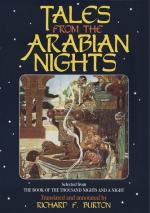[FN#159] In text “Wijak,” a stove, a portable hearth.
[FN#160] In the text: ["Wa sara kulla-ma tastari nafsuhu yak’ad kuddama ’l-Darwish,” which I would translate: and each time his heart chose (8th form of “Sarw”) he used to sit before the Darwaysh, etc.—st.]
[FN#161] In text “Darin” for “Zarin"=what is powdered, collyrium.
[FN#162] The King failed because his “Niyat” or intention was not pure; that is, he worked for wealth, and not, as the Darwaysh had done, for the good of his brother man.
[FN#163] For the importance attached to this sign of sovereignty see in my Pilgrimage (ii. 218-19) the trouble caused by the loss of the Prophet’s seal-ring (Khatim) at Al-Madinah.
[FN#164] The text is somewhat doubtful—“Min kuddam-ak.” [Perhaps it means only “from before thee,” i.e. in thy presence, without letting him out of sight and thereby giving him a chance of escape.—St.]
[FN#165] This especially is on the lines of “The Physician Duban”; vol. i. 45.
[FN#166] In text “Wa min-hum man faha,” evidently an error of the scribe for “Man nafahu.” Scott (vi. 351), after the fashion of the “Improver-school,” ends the tale, which is somewhat tail-less, after this fashion, “At the same instant, the Sultan and his courtiers found themselves assaulted by invisible agents, who, tearing off their robes, whipped them with scourges till the blood flowed in streams from their lacerated backs. At length the punishment ceased, but the mortification of the Sultan did not end here, for all the gold which the Dirveshe had transmuted returned to its original metals. Thus, by his unjust credulity, was a weak Prince punished for his ungrateful folly. The barber and his son also were not to be found, so that the sultan could gain no intelligence of the Dirveshe, and he and his courtiers became the laughing-stock of the populace for years after their merited chastisement.” Is nothing to be left for the reader’s imagination?
[FN#167] See under the same name the story in my Suppl. vol. i. 162; where the genealogy and biography of the story is given. I have translated the W.M. version because it adds a few items of interest. A marginal note of Scott’s (in the W.M. Ms. v. 196) says that the “Tale is similar to Lesson iv. in the Tirrea Bede.” See note at the end of this History.
[FN#168] For the Badawi tent, see vol. vii. 109.
[FN#169] In text “Birkah"=a fountain-basin, lake, pond, reservoir. The Bresl. Edit. has “Sardab"=a souterrain.
[FN#170] Arab. “Jummayz”: see vol. iii. 302. In the Bresl. Edit. it is a “tall tree,” and in the European versions always a “pear-tree,” which is not found in Badawi-land.
[FN#171] “Adi” in Egyptian (not Arabic) is=that man, the (man) here; “Adini” (in the text) is=Here am I, me voici. Spitta Bey (loc. cit. iv. 20, etc.)
[FN#172] Arab. “Ma’murah.” In the Bresl. Edit. “the place is full of Jinns and Marids.” I have said that this supernatural agency, ever at hand and ever credible to Easterns, makes this the most satisfactory version of the world-wide tale.




